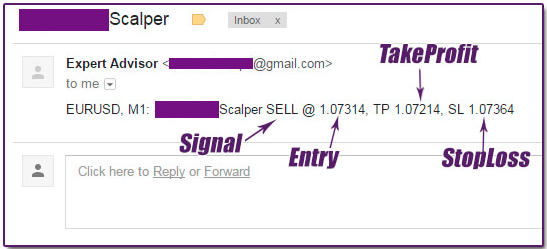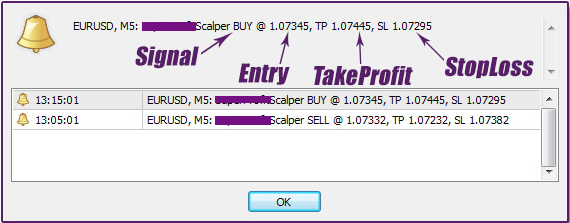I have been using an indicator to take trades. I didn't develop the indicator, so I only have access to the .ex4 file. How can I extract the take profit, open trade and stop loss values in the alerts or email signals to open trades? Please see a sample of the email and alert signals below.
Here is a working example script of a native MQL solution which uses kernel32.dll to copy the log file from ./MQL4/Logs to ./MQL4/Files. The LogSignalParser abstract base class needs to be subclassed and requires implementation of the virtual bool parse() method.
Edit: @TenOutOfTen would like a practical example of how to parse the following row format in a log file:
0 02:20:00.874 SuperIndicator USDCAD,M5: Alert: USDCAD, M5: Super Indicator SELL @ 1.29136, TP 1.28836, SL 1.29286
Step 1: Save the LogParser.mqh somewhere meaningful.
//LogParser.mqh
#property strict
#include <stdlib.mqh>
#include <Arrays\ArrayString.mqh>
#include <Arrays\ArrayObj.mqh>
#import "kernel32.dll"
bool CopyFileW(string lpExistingFileName,
string lpNewFileName,
bool bFailIfExists);
#import
//+------------------------------------------------------------------+
//|
//+------------------------------------------------------------------+
class Signal : public CObject
{
public:
string symbol;
datetime signal_time;
int order_type;
double price_entry;
double price_sl;
double price_tp;
virtual int Compare(const CObject *node,const int mode=0) const override
{
const Signal *other=node;
if(this.signal_time>other.signal_time)
return 1;
if(this.signal_time<other.signal_time)
return -1;
return 0;
}
string to_string()
{
return StringFormat("%s - %s(%s) @ %.5f, SL=%.5f, TP=%.5f",
signal_time,
symbol,
order_type==OP_BUYLIMIT ? "BUY" : "SELL",
price_entry,
price_sl,
price_tp
);
}
};
//+------------------------------------------------------------------+
//|Vector-like collection
//+------------------------------------------------------------------+
class SignalList : public CArrayObj
{
public: Signal *operator[](int i){return this.At(i);}
};
//+------------------------------------------------------------------+
//|Abstract abse class: the parse method must be implemented in subclass
//+------------------------------------------------------------------+
class LogSignalParser : public CObject
{
protected:
CArrayString m_rows;
SignalList m_signals;
string m_log_file_name;
string m_ind_name;
public:
LogSignalParser(string indicator_name);
// parse method must be overridden!
virtual bool parse() = 0;
int Total();
Signal *operator[](int i);
protected:
bool _copy_log();
int _open_log();
bool _parse_rows();
};
//+------------------------------------------------------------------+
LogSignalParser::LogSignalParser(string indicator_name)
{
m_log_file_name="copy_log.log";
m_ind_name=indicator_name;
}
//+------------------------------------------------------------------+
bool LogSignalParser::_copy_log(void)
{
MqlDateTime t;
TimeLocal(t);
string data_path = TerminalInfoString(TERMINAL_DATA_PATH)+"\\MQL4";
string logs_path = data_path + "\\Logs\\";
string dest_file = data_path + "\\Files\\" + m_log_file_name;
string log_file=logs_path+StringFormat("%d%02d%02d.log",
t.year,t.mon,t.day);
return CopyFileW(log_file, dest_file, false);
}
//+------------------------------------------------------------------+
bool LogSignalParser::_parse_rows()
{
if(!this._copy_log())
return false;
int h= this._open_log();
if(h == INVALID_HANDLE)
return false;
m_rows.Clear();
while(!FileIsEnding(h)){
string row=FileReadString(h);
if(StringFind(row,"Alert:") >= 0 && StringFind(row,m_ind_name) >= 0)
m_rows.Add(row);
}
m_rows.Sort();
FileClose(h);
return true;
}
//+------------------------------------------------------------------+
int LogSignalParser::_open_log(void)
{
return FileOpen(m_log_file_name,
FILE_TXT|FILE_READ|FILE_SHARE_READ|FILE_SHARE_WRITE);
}
//+------------------------------------------------------------------+
int LogSignalParser::Total(void)
{
return m_signals.Total();
}
//+------------------------------------------------------------------+
Signal* LogSignalParser::operator[](int i)
{
return m_signals.At(i);
}
Step 2: Subclass the LogSignalParser class and override parse
//SuperIndicatorParser.mqh
#property strict
#include "LogParser.mqh"
//+------------------------------------------------------------------+
class SuperIndicatorParser : public LogSignalParser
{
public:
SuperIndicatorParser():LogSignalParser("SuperIndicator"){}
virtual bool parse() override;
};
//+------------------------------------------------------------------+
//+------------------------------------------------------------------+
bool SuperIndicatorParser::parse() override
{
if(!this._parse_rows())
return false;
m_signals.Clear();
MqlDateTime local;
TimeLocal(local);
for(int i=m_rows.Total()-1; i>=0; i--)
{
string row=m_rows[i];
MqlDateTime log_time;
TimeToStruct(StringToTime(StringSubstr(row, 2, 12)), log_time);
log_time.year = local.year;
log_time.mon = local.mon;
log_time.day = local.day;
datetime time = StructToTime(log_time);
row = StringSubstr(row, StringFind(row, m_ind_name) + StringLen(m_ind_name) + 1);
StringReplace(row, ",", " ");
string parts[];
StringSplit(row, ' ', parts);
int len = ArraySize(parts);
string debug = "";
for(int k=0;k<len;k++)
debug += "|" + parts[k];
if(len != 17)
continue;
Signal *s = new Signal();
s.signal_time = time;
s.symbol = parts[0];
s.order_type = parts[8] == "BUY" ? OP_BUYLIMIT : OP_SELLLIMIT;
s.price_entry = double(parts[10]);
s.price_tp = double(parts[13]);
s.price_sl = double(parts[16]);
m_signals.Add(s);
}
m_signals.Sort();
return true;
}
Step 3: Use in MQL program (example script)
#property strict
#include "SuperIndicatorParser.mqh"
//+------------------------------------------------------------------+
//| Script program start function |
//+------------------------------------------------------------------+
void OnStart()
{
SuperIndicatorParser parser;
if(parser.parse()){
for(int i=parser.Total()-1; i>=0; i--){
Signal *s = parser[i];
int ticket = OrderSend(
s.symbol, s.order_type, 0.1,
s.price_entry, 0, s.price_sl, s.price_tp
);
if(ticket < 0){
Print(_LastError);
}
}
}
}
There's no need to pull the data from your email since the indicator is also sending the data via the Alert function. Alerts are logged to the .\MQL4\Logs directory in a *.log text file. You could write some MQL which uses win32 to read the log, and then make your own parser in MQL.
Another option is to write a watchdog script to scan and parse the log file and write the results to a csv where the EA can access it. The benefit of this method is how easy it is to develop compared to an MQL solution and since it works for all symbols it avoids a potential race condition where multiple EAs are trying to read log write csv at the same time.
Here is an example written in Python.
import csv
import re
import time
from datetime import datetime
from pathlib import Path
MQL_DATA_PATH = Path(
'C:/Users/user/Desktop/MT-TEST/Vanilla-MT4-v0_0_2/MT4/MQL4'
)
OUTPUT_FILENAME = 'signals.csv'
signal_pattern = re.compile(r'''# regex - verbose mode
(?P<time>\d\d:\d\d:\d\d).*? # time stamp
(?P<symbol>[A-Z]{6}\w*),.*? # symbol with ECN suffix
(?P<type>BUY|SELL).*? # BUY or SELL command
(?P<price>\d+\.\d+).*? # execution price
(?P<tp>\d+\.\d+).*? # takeprofit
(?P<sl>\d+\.\d+) # stoploss
''', re.VERBOSE)
def log_to_csv():
date = datetime.now()
log_file = MQL_DATA_PATH / 'Logs' / f'{date.strftime("%Y%m%d")}.log'
with open(log_file) as f:
log_entries = f.read()
signals = [s.groupdict() for s in signal_pattern.finditer(log_entries)]
for signal in signals:
# correct time to MQL datetime
signal['time'] = f"{date.strftime('%Y.%m.%d')} {signal['time']}"
csv_file = MQL_DATA_PATH / 'Files' / OUTPUT_FILENAME
with open(csv_file, 'w') as f:
writer = csv.DictWriter(f,
fieldnames=('time', 'symbol', 'type', 'price', 'tp', 'sl',),
lineterminator='\n',
)
writer.writerows(signals)
def main():
print(f'Watching MQL log and saving signals to {OUTPUT_FILENAME}')
print('Press Ctrl+C to exit')
while True:
try:
log_to_csv()
print(datetime.now().strftime('%Y.%m.%d %H:%M:%S'), end='\r')
time.sleep(5)
except KeyboardInterrupt:
exit()
if __name__ == '__main__':
main()
0 02:20:00.874 SuperIndicator USDCAD,M5: Alert: USDCAD, M5: Super Indicator SELL @ 1.29136, TP 1.28836, SL 1.29286. I would really appreciate your assistance. –
Sixtasixteen *.py extension and then you will run it from the command line. C:\Path\To\Script>python log_parser.py. I'm not sure if it will work with mac since you're likely using a virtual machine... –
Rato MT4 cannot read your emails. You need to employ some other tools or a more universal language to read your emails, Java.Mail.API or Pyhton, or something else.
Read the email, make sure the the format is correct and it is from the sender you are expecting, then put down the message into a file that is available to MT4 - either own folder (C:\Users\UserName\AppData\Roaming\MetaQuotes\Terminal\12345678E7E35342DB4776F5AE09D64B\MQL4\Files) or Common folder (C:\Users\User1\AppData\Roaming\MetaQuotes\Terminal\Common\Files). Then read the file from the MT4 application using FileSearchNext() function and example in MQL4 docs. After reading the file, you need to parse it with the String functions, and create a OrderSend() request (probably check the input and that your logic allows your robot to send a trade, e.g. you do not have reached maximum of allowed open trades, trading time, other logic).
ChartEventCustom() after the alert, and you would mention symbol, tf and alert message (or at least direction) in that Event. But you cannot edit the indicator without the source. –
Liston 0 02:20:00.874 SuperIndicator USDCAD,M5: Alert: USDCAD, M5: Super Indicator SELL @ 1.29136, TP 1.28836, SL 1.29286. Isn't there anyway this string can be accessed and formatted from the .log file in an EA using mql? –
Sixtasixteen nicholishen showed a python example on how to get the data from the logs. You cannot access the Logs folder from an expert advisor directly, you need at least DLL or another engine that does not have such restrictions –
Liston © 2022 - 2024 — McMap. All rights reserved.



0 02:20:00.874 SuperIndicator USDCAD,M5: Alert: USDCAD, M5: Super Indicator SELL @ 1.29136, TP 1.28836, SL 1.29286– Sixtasixteen